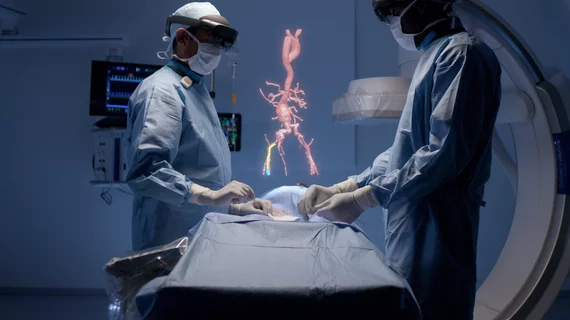Microsoft, Philips release new augmented reality application for image-guided procedures
Royal Philips and Microsoft recently unveiled their latest technological collaboration for “the operating room of the future," which combines Philips’ Azurion image-guided therapy platform and Microsoft’s newly released HoloLens 2 holographic (AR) augmented reality headset to help create novel AR applications for image-guided minimally invasive therapy.
The new AR or “mixed reality” concept was officially announced Monday, Feb. 25 at the 2019 Mobile World Congress in Barcelona alongside the release of the $3,500 Microsoft HoloLens 2 AR headset now available for pre-order in the corporate and medical sectors, according to a recent Philips press release.
The concept incorporates live imaging and displays patient data on large two-dimensional (2D) screens into a three-dimensional (3D) holographic augmented reality environment that is completely controlled by the surgeon or physician.
With the HoloLens 2, users can see and control live data and 3D medical imagery needed to guide precision therapy, while Azurion allows for control through voice recognition, eye tracking and specific gestures.
“The transition from open surgery to image-guided procedures has driven a seismic shift in improving patient outcomes and reducing costs—not least by dramatically reducing the length of time a patient stays in a hospital after their procedure,” Atul Gupta, MD, chief medical officer for image-guided therapy at Philips and an interventional and diagnostic radiologist, said in a prepared statement. “It’s all about keeping our focus on the patient.”
Microsoft CEO Satya Nadella told CNN Business in a recent interview that the HoloLens 2 will be more comfortable than the previous version released in 2016 and also has higher resolution graphics, advanced cloud integration and a wider field of view.
The FDA gave 510(k) clearance to Microsoft’s OpenSight AR System for pre-surgical planning this past October, the first FDA-approved AR medical solution for the HoloLens headset.

